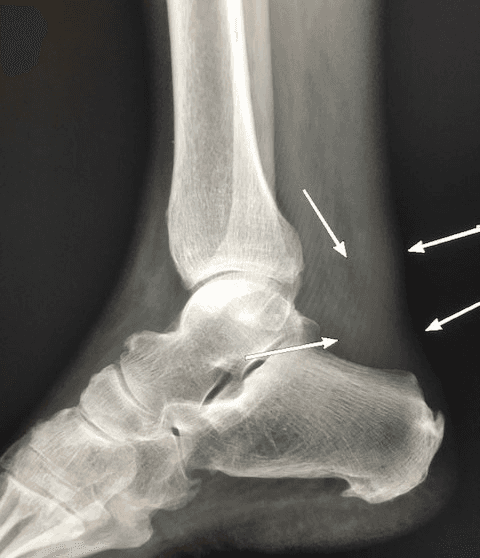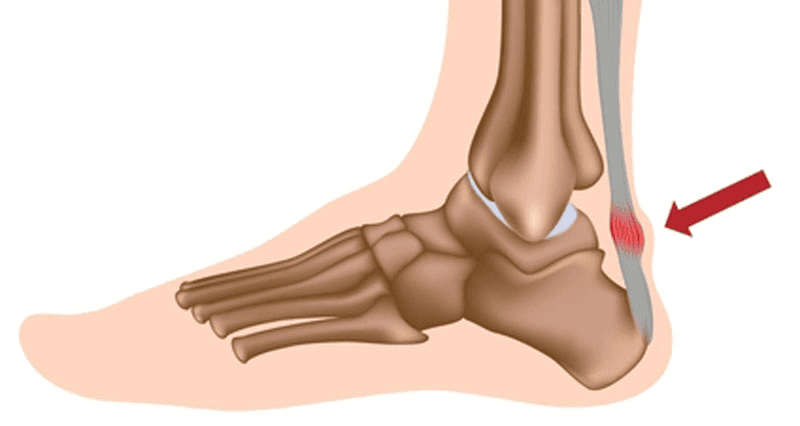
Achilles Tendinitis
Achilles Tendinitis
Achilles Tendinitis
Take the first step to better health with Dr. Chowdhury, our highly experienced Foot & Ankle Surgeon!
Take the first step to better health with Dr. Chowdhury, our highly experienced Foot & Ankle Surgeon!
Take the first step to better health with Dr. Chowdhury, our highly experienced Foot & Ankle Surgeon!
Request Appointment
Request Appointment
Request Appointment



Overview
Achilles tendinitis involves inflammation and pain in the Achilles tendon, which runs down the back of the leg and connects to the heel. This tendon, the largest in the body, is essential for activities like walking, running, and jumping. Overuse or degeneration can lead to irritation and inflammation, commonly known as tendinitis. This condition can also be associated with the formation of bone spurs at the heel bone (calcaneus).
Overview
Achilles tendinitis involves inflammation and pain in the Achilles tendon, which runs down the back of the leg and connects to the heel. This tendon, the largest in the body, is essential for activities like walking, running, and jumping. Overuse or degeneration can lead to irritation and inflammation, commonly known as tendinitis. This condition can also be associated with the formation of bone spurs at the heel bone (calcaneus).
Overview
Achilles tendinitis involves inflammation and pain in the Achilles tendon, which runs down the back of the leg and connects to the heel. This tendon, the largest in the body, is essential for activities like walking, running, and jumping. Overuse or degeneration can lead to irritation and inflammation, commonly known as tendinitis. This condition can also be associated with the formation of bone spurs at the heel bone (calcaneus).
Causes & Symptoms
Achilles tendinitis typically develops from repetitive stress, a sudden increase in exercise intensity, tight calf muscles, and the presence of bone spurs. Symptoms include:
- Pain and stiffness along the tendon
- Worsening pain with activity
- Thickening of the tendon
- Soft tissue swelling around the area
- Decreased range of motion in the ankle
Achilles tendinitis can make the tendon more susceptible to ruptures. While imaging is usually not required for diagnosis, an x-ray can reveal bone spurs if degenerative changes are present.
Causes & Symptoms
Achilles tendinitis typically develops from repetitive stress, a sudden increase in exercise intensity, tight calf muscles, and the presence of bone spurs. Symptoms include:
- Pain and stiffness along the tendon
- Worsening pain with activity
- Thickening of the tendon
- Soft tissue swelling around the area
- Decreased range of motion in the ankle
Achilles tendinitis can make the tendon more susceptible to ruptures. While imaging is usually not required for diagnosis, an x-ray can reveal bone spurs if degenerative changes are present.
Treatment & Prevention
Treatment is often conservative, involving rest, ice, NSAIDs, and physical therapy focusing on stretching exercises. However, it may take several months for symptoms to improve. Preventative measures include stretching calf muscles before and after physical activity and wearing appropriate footwear to avoid this condition.
Treatment & Prevention
Treatment is often conservative, involving rest, ice, NSAIDs, and physical therapy focusing on stretching exercises. However, it may take several months for symptoms to improve. Preventative measures include stretching calf muscles before and after physical activity and wearing appropriate footwear to avoid this condition.
Request Appointment
Request Appointment
Struggling With Achilles Tendinitis?
Struggling With Achilles Tendinitis?
SPORTS FOOT &
ANKLE CENTER
Services
Achilles Tendonitis
Ankle Fracture
Lisfranc Injury
Ankle Sprain
... + 20 more
Testimonials
Liam Hester
John Hester
Kathy Gallagher
Kendra Grompone
Luke42 D’Altilio
Location
Contact
207-777-1245
dr.einfootandankle
@gmail.com
SPORTS FOOT &
ANKLE CENTER
Services
Achilles Tendonitis
Ankle Fracture
Lisfranc Injury
Ankle Sprain
... + 20 more
Reviews
Jessica Peri
Sameer Alam
Noman Saleemi
Andres Botero
…+ 6 more
Contact
201-777-1245
dr.einfootandankle@gmail.com
Location
SPORTS FOOT &
ANKLE CENTER
Services
Achilles Tendonitis
Ankle Fracture
Lisfranc Injury
Ankle Sprain
... + 20 more
Testimonials
Jessica Peri
Sameer Alam
Noman Saleemi
Andres Botero
…+ 6 more
Location
Contact
201-777-1245
dr.einfootandankle
@gmail.com
SPORTS FOOT &
ANKLE CENTER
Services
Achilles Tendonitis
Ankle Fracture
Lisfranc Injury
Ankle Sprain
... + 20 more
Reviews
Jessica Peri
Sameer Alam
Noman Saleemi
Andres Botero
…+ 6 more
Location
Contact
201-777-1245
dr.einfootandankle@gmail.com










Causes & Symptoms
Achilles tendonitis typically develops from repetitive stress, a sudden increase in exercise intensity, tight calf muscles, and the presence of bone spurs. Symptoms include:
- Pain and stiffness along the tendon
- Worsening pain with activity
- Thickening of the tendon
- Soft tissue swelling around the area
- Decreased range of motion in the ankle
Achilles tendonitis can make the tendon more susceptible to ruptures. While imaging is usually not required for diagnosis, an x-ray can reveal bone spurs if degenerative changes are present.
Treatment & Prevention
Treatment is often conservative, involving rest, ice, NSAIDs, and physical therapy focusing on stretching exercises. However, it may take several months for symptoms to improve. Preventative measures include stretching calf muscles before and after physical activity and wearing appropriate footwear to avoid this condition.